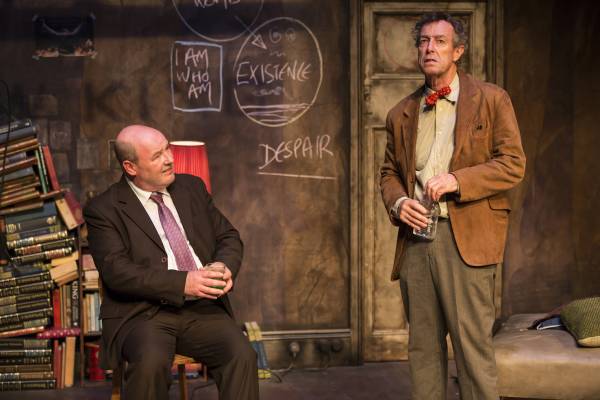O’Punksky’s Theatre
Eternity Playhouse, April 8

Long? The Maus beside me was nearly screaming and my legs beneath me were screaming. Yes, at over three hours Tom Murphy’s The Gigli Concert is long by modern standards, but the frustration is with the fact that the play cries out for cutting. It is almost on its knees begging – not because it is bad, but because it is so close to greatness.
The psychological interdependence that gradually intertwines The Irishman (Maeliosa Stafford) and the shrink-quack from whom he seeks help, JPW King (Patrick Dickson) is fascinating, involving, funny and deeply touching. Stafford and Dickson are masterful. The latter makes King – whose cottage psychology epitomises the saying that a little bit of knowledge is a dangerous thing – so likeable that we forgive him both his charlatanism and his despair. Stafford is extraordinarily deft at gradually exposing the underbelly of a character who is enigmatic and by nature imperious. The chemistry between the two as they revisit roles they know so well is as good as anything to be found on an Australian stage.
The third character is officially listed as being Mona (Kim Lewis), but more truthfully it is Beniamino Gigli, the great Italian tenor, whose recordings punctuate the play with moments of exultant glory amid the shabbiness, hurt and suffering. Mona, by contrast, although superbly played by Lewis, is the non-catalyst without whom Murphy may have had the utterly magical two-hander (plus Gigli!) that the play yearns to be.
Director John O’Hare obviously sees the length as a non-issue, as he allows the action to unfold at a meandering pace that mirrors the shambolic nature of King’s life. The stage-business as this amateur shrink hurriedly tries to make his room and himself marginally more presentable for each of The Irishman’s visits is a delight. So is the way Murphy’s understated humour is realised, once again riding high on the Stafford/Dickson chemistry.
Gordon Burns’s set and Alison Bradshaw’s costumes hark back to an earlier era with film-noirish overtones, although, oddly, the sound system that The Irishman introduces on which to play Gigli’s golden voice is of the modern digital variety.
By the end it was an ecstasy to stretch my legs, but I was also grateful to have witnessed two of our finest actors immersed in a deep collaboration, from which humanism – and the voice of Gigli – emerge triumphant.
Until May 4.